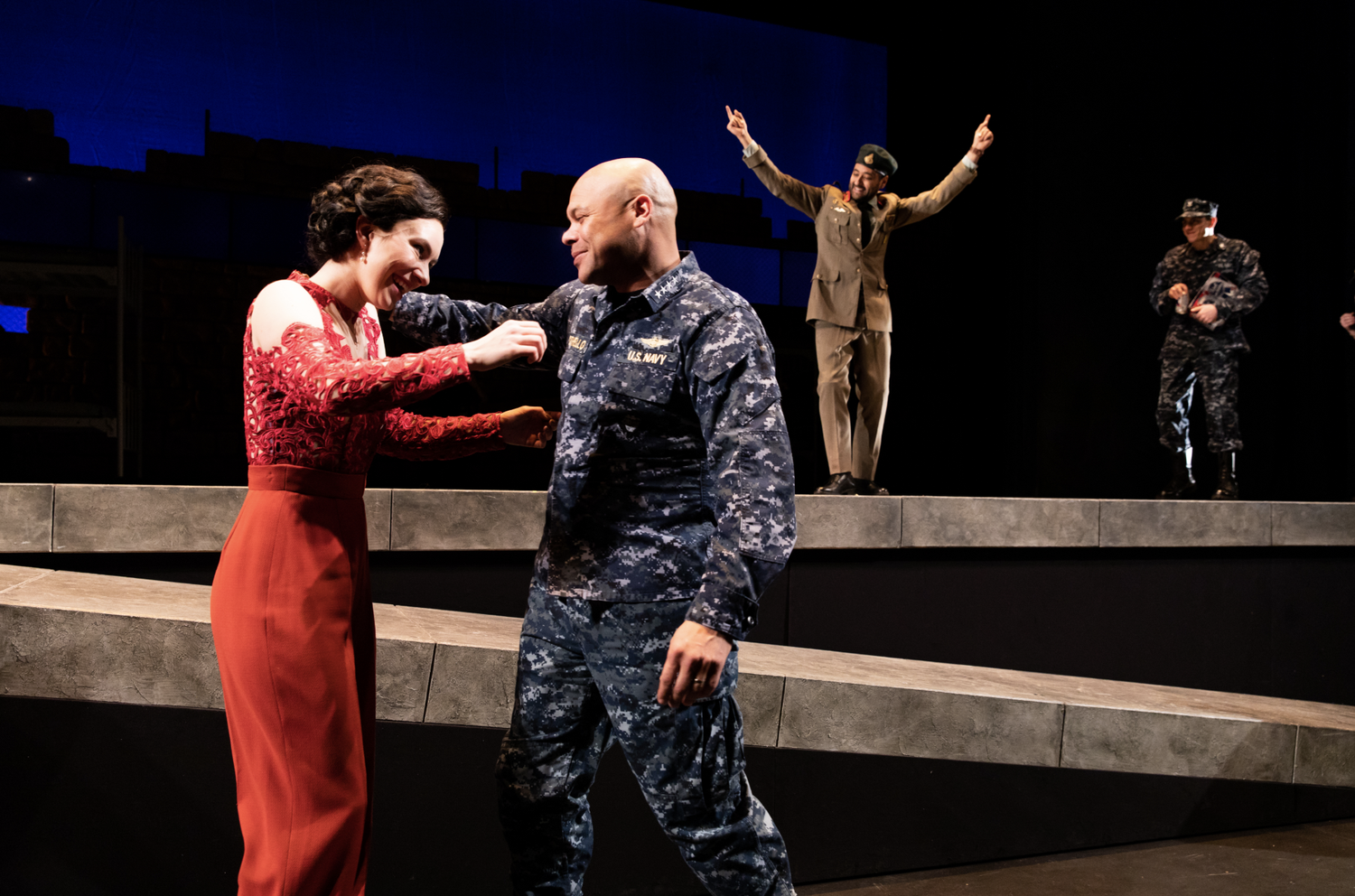
News
HMS Is Facing a Deficit. Under Trump, Some Fear It May Get Worse.

News
Cambridge Police Respond to Three Armed Robberies Over Holiday Weekend

News
What’s Next for Harvard’s Legacy of Slavery Initiative?

News
MassDOT Adds Unpopular Train Layover to Allston I-90 Project in Sudden Reversal

News
Denied Winter Campus Housing, International Students Scramble to Find Alternative Options
Oregon Shakespeare Festival Brings ‘Othello’ to Contemporary America

The Oregon Shakespeare Festival’s “Othello” at the A.R.T. until Feb. 9 forgoes the play’s traditional settings. It replaces the usual Renaissance Venice with a more lugubrious, yet modern American city (with the opening scenes taking place outside of a seedy nightclub) and Renaissance Cyprus with a village whose sand-toned architecture is reminiscent of the Middle East. While the contemporary and indistinct setting feels somewhat at odds with a play whose customary locations feel so integral to the show’s themes, the acting provides the production its strength and momentum.
Had the changes in location been more closely tailored to match the original settings’ symbolism, they would have been clearer and more successful. As they stand, the contemporary setting feels rather arbitrary, perhaps even confused — Venice is supposed to represent a place of order and rationality where Othello’s sexual interest in Desdemona remains suppressed.
In many productions, Venice stands somewhat at odds with Cyprus, which encompasses a world of extreme passion. It is Aphrodite’s birthplace, after all. These different cities enable and unpack the different sides of Othello. For this reason, it is not until he arrives in Cyprus that Othello’s measured love begins to fall away into deep frenzied jealousy: “Perdition catch my soul / But I do love thee! And when I love thee not, / Chaos is come again.” Yet the production seems to miss some of these major points by changing the scenery. In the third act, when Iago attempts to sow more poison about Desdemona in Othello’s ears, the two characters are working out in a modern gym with a row of television screens behind them. This choice might be an attempt at the comedic, but it feels gimmicky and purposeless. Ultimately, the changes to the setting do not convey the symbolic characteristics of the different location, which are central to the play’s themes.
Some of the other changes are more effective in translating the story to the modern day. Equipped in a resplendent white navy officer’s suit, Othello is an admiral rather than a general, which is befitting for a play transferred to the United States. Actor Chris Butler and director Bill Rauch looked to the lives of Sudanese boys, often called the Lost Boys of Sudan, for inspiration for the character’s background. These Lost Boys were children who were caught in the terror and violence of the country’s second civil war (1983-2005), forced into military service and perhaps even slavery — experiences that are not too distant from those faced by Othello himself. In fact, the parallel is almost uncanny.
One of several strong actors, Butler does a fantastic job of adjusting the cadences of his speech such that it is much slower, pronounced, and rhythmic than that of all the other characters on stage. As much as he protests that he is not an orator, Othello is the greatest storyteller of all and Butler’s presentation puts his eloquence on display. Butler also renders Othello’s moments of regret and mania exquisitely, particularly his fits of jealousy, which on paper can be difficult to imagine, but when handled masterfully in his hands engender tangible anguish and tremulousness.
Danforth Comins presents a more unusual interpretation of Iago. He is still the central villain of the play who sets everything in motion by nudging the other characters into action with his careful whispers. Though most readings of Iago peg him as the cold-blooded plotter with an irrational xenophobic hate for Othello, Comins’ version lends a manic and emotional tinge to the character’s pronounced racism. More than anything, his dislike of the admiral stems from profound anger at being cuckolded. The vehemence with which Comins’ Iago discusses potential encounters between Othello and his wife Emilia makes him more like a jealous and vengeful lover than a bitter subordinate. His character appears much more human and vulnerable — though by no means is the portrait sympathetic.
Emilia is equally delightful. Played by Amy Kim Waschke, Emilia shines in many of the scenes that she is in with her character’s well-known humor and later, her heartbreaking lament. Waschke delivers Emilia’s candor and tribulations — particularly about husbands and wives – courageously, giving the words an almost feminist turn that feel timely and natural.
Altogether, the cast is incredibly strong, a force that carries the play on in a psychological and deeply serious play. Though its setting makes it feel a bit unmoored, “Othello” does not suffer too much for it — it is still an incredibly thoughtful production, which successfully delivers oft-repeated themes and raises important questions regarding gender, race, and power while continuing to make them at once relevant and urgent.
—Staff writer Aline G. Damas can be reached at aline.damas@thecrimson.com.
Want to keep up with breaking news? Subscribe to our email newsletter.
